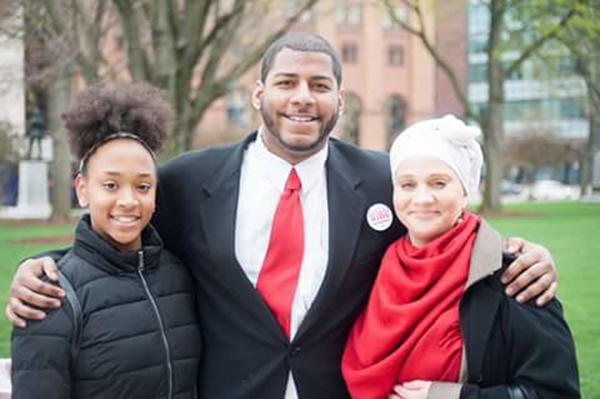
This is the third article in a series, “From the Ground Up,” chronicling community-level efforts to overcome economic insecurity and establish sustainable and just communities. A joint project of Occupy.com and Commonomics USA, the series features individuals and organizations around the U.S. taking power into their own hands in the service of others. Read the first and second articles here.
Dennis Black twice left Detroit for Ferguson, Missouri, to organize and march in solidarity against police brutality and economic inequality. During his second trip, “one of the largest actions I have ever been a part of took place,” he says. With around a thousand people in the street, “the lead organizer gave the order to split ourselves in half before marching out, where one group acted as a red herring” to fool the police, while “the other half marched to St. Louis University for an occupation that lasted seven days.” The diversion worked. Strategy is important.
His trips to Ferguson earned him and hundreds of other organizers criminal charges. But he got something much more important out of it: inspiration and education in the ongoing struggle for economic justice. Back in Detroit, Dennis Black decided to run for Michigan State Representative.
Capitalism Wrote Off Detroit
For those consciously or unconsciously invested in capitalism and white supremacy, the fate of Detroit vindicates the assumption that the working class and people of color cannot manage themselves. That the city filed for bankruptcy in 2013 tends to further validate this view. The colonialist narrative holds that Detroiters’ attempt at self-management failed because of residents’ and workers’ greed and irresponsibility.
In fact, while there were some corrupt and incompetent public officials involved – the kind that exist in almost every big city and some smaller ones too – Detroit ran out of money because it had been stolen from the city. This happened through decades of carefully engineered de-industrialization led by both Republican and Democratic presidential administrations; declining tax revenues brought on by the Great Recession; deliberate diversion of money earmarked for the city; emergency management laws that stripped Detroit and other urban areas in the state of democratic control; and endless years of redlining, de facto segregation, and economic disenfranchisement.
Wall Street financial firms put the nails in the coffin, convincing the city to enter into a series of highly complex derivative swaps the bankers promised would make the city solvent. When interest rates tanked in 2009, Detroit had lost the bet. Wall Street got its money, but everyone else lost.
“Multiphrenic Resistance”
Dennis Black is a revolutionary running for office. He knows that resistance fighters need to be both inside and outside institutions of power. He talks theory, but it is the theory of someone who spends as much time in the streets as at the library.
“Resistance to this current system of domination must be multiphrenic in approach,” he says, meaning that it reconciles multiple identities and multiple messages. “There is not a single method or tactic that can overcome the powers that be.”
Seeing “the sheer level of military sophistication that a small police department had” in Ferguson convinced Black that monolithic strategies would not succeed. “Structural violence is crafted in the ambiguity found in the law,” he says. So we need grassroots activists to re-make the law.
New Models, New Policies
Black has the benefit of seeing and participating in many new models of economic justice around him. Detroit is full of sites of new economy, new ethics, and new resistance. When outsiders say the city’s economy has collapsed, they mean its bourgeois economy – its conventional means of working people creating surplus value for shareholders. But something better is growing in place of all that. Black is impassioned as he talks about the grassroots economic activity taking place in the city now.
There’s the Field Street Cooperative, “an incubator for leadership and innovation in the city,” where Black Lives Matter joins with cooperative endeavors built by residents to meet their own economic needs. There is Detroit Eviction Defense and Charlevoix Villages Association, groups that have fought back – in many cases successfully – against eviction efforts and kept people in their houses. There are the community gardens where Black himself has learned how to farm. Black mentions entrepreneurs and leaders in the city like his friend Jarren Schlaff, who has co-founded a company that makes eco-friendly handmade leather boots, and Yusef Bunchy Shakur, who is “restoring a once stripped away house into a community center and bookstore. Yusef’s paradigm around building and organizing should be modeled,” Black says.
Black is seeking a legislative seat in order to push for large-scale structural changes that match the magnitude of the grassroots economic justice efforts going on in his Detroit neighborhoods. He would repeal the emergency manager law, which has “disenfranchised more than half of Michigan’s Black population from local governance.” He would force a forensic audit of municipalities and school districts that have been under the emergency manager law for two years or more. He would work to reform the state’s penal code and legalize marijuana. He wants to cut the incarcerated population in half.
“There are 39 prisons in Michigan, representing the operational costs of the Michigan Department of Corrections budget, which amount to 60% of the $2 billion allocated budget, or $1.2 billion. While I will fight like hell to close these plantations, there is a need to shift that money into re-entry programs that lead to apprenticeships, particularly those in the green skilled trade sector,” he says.
Black would also push for radical improvements in public transit and workforce development, with an emphasis on appropriately scaled green jobs. And he promises to empower municipalities. Currently, a Michigan law bans individual cities from determining their own minimum wage levels or entering into “community benefit agreements” to hire people from urban areas, as well as meeting race and gender makeup requirements. Add to that a repeal of Michigan's Right-to-Work law, and Black has a long list of things that need turning around.
But Black’s most ambitious policy proposal is a full-scale infrastructure restoration effort, funded by public-private partnerships, a slight increase in taxes on corporations that pollute the Great Lake Shoreline, and the state’s Budget Stabilization Fund. The implications of infrastructure funding in Michigan cut deep – including the criminal tragedy of water contamination in Flint. Black tells me that the state will need $18 billion in water and sewage infrastructure repairs to meet EPA standards over the next 20 years.
As an activist and now as a candidate, he sees his journey as one of building up what has been torn down since “the U.S. has transformed into the post-9/11 state.” The economy of extraction and exploitation has evolved into a machine of destruction for poor people and people of color. This “endless war the U.S. has found itself in since 2001” is not just a war against external forces, but against the internal ones who, often against their will, built the empire. “Everyone has their role to play in this movement,” Black says.
“I will not be able to get everything done. I just hope that what little I can do can be put in the hands of organizers and community on the outside.”
Matt Stannard is policy director at Commonomics USA and a board member of the Public Banking Institute.
If you liked what you read and want to see more original reporting on Occupy.com, please donate today!
3 WAYS TO SHOW YOUR SUPPORT
- Log in to post comments

















Comments
Nancy Jakeman replied on
Sense of a fresh wind...
Those of us who are activists for the common good, and watching events play out on Earth are heartened by the stepping forward of people such as Dennis Black.
DH Fabian replied on
insecurity vs. hopelessness
Most people experience a measure of economic insecurity at some point in their lives, and that's nothing new. The critically important thing is that Americans lack the courage and honesty to address is our poverty crisis. Inexplicably, people can grasp the fact that not everyone is able to work (health, etc.), and the figures show that there aren't jobs for all. Yet, the better-off have utter contempt for those who are left behind. We deny them the most basic human rights (per the UN's UDHR) of food and shelter. Real poverty, and our poor, have virtually been erased from the public discussion, and as far as I can determine, the reason is that we no longer regard them as actual human beings -- more like a subspecies.
The majority of US poor are white. On the rare occasion that poverty is mentioned, we call poor black people "disadvantaged," and poor white people "white trash." This matters. Still, in the minds of our liberal bourgeoisie, this remains a land of opportunity for all who bother to try. Our media do little to dispel this fantasy.
Since it's impossible to save/rebuild the middle class without legitimately addressing poverty, things in the US aren't going to improve.